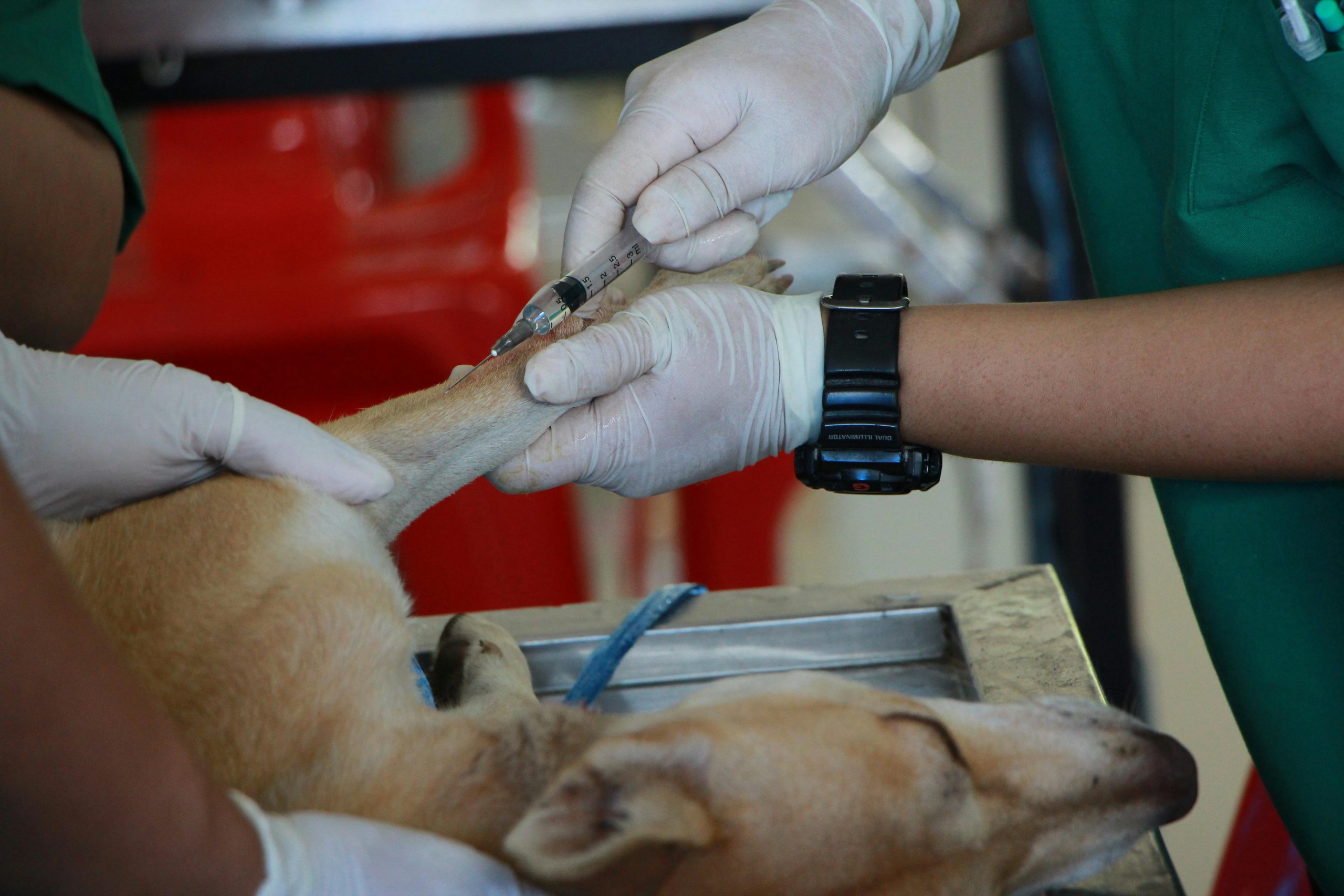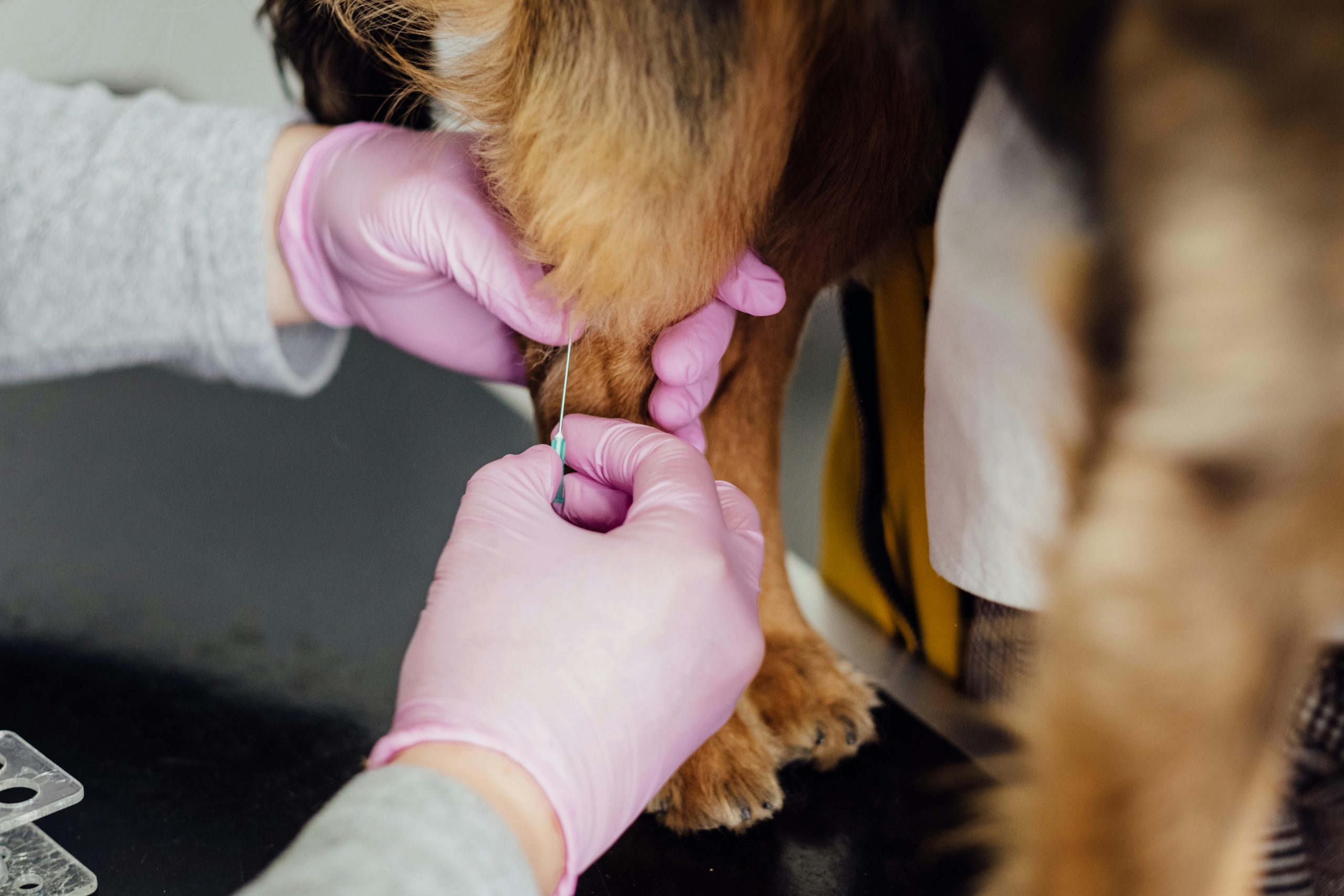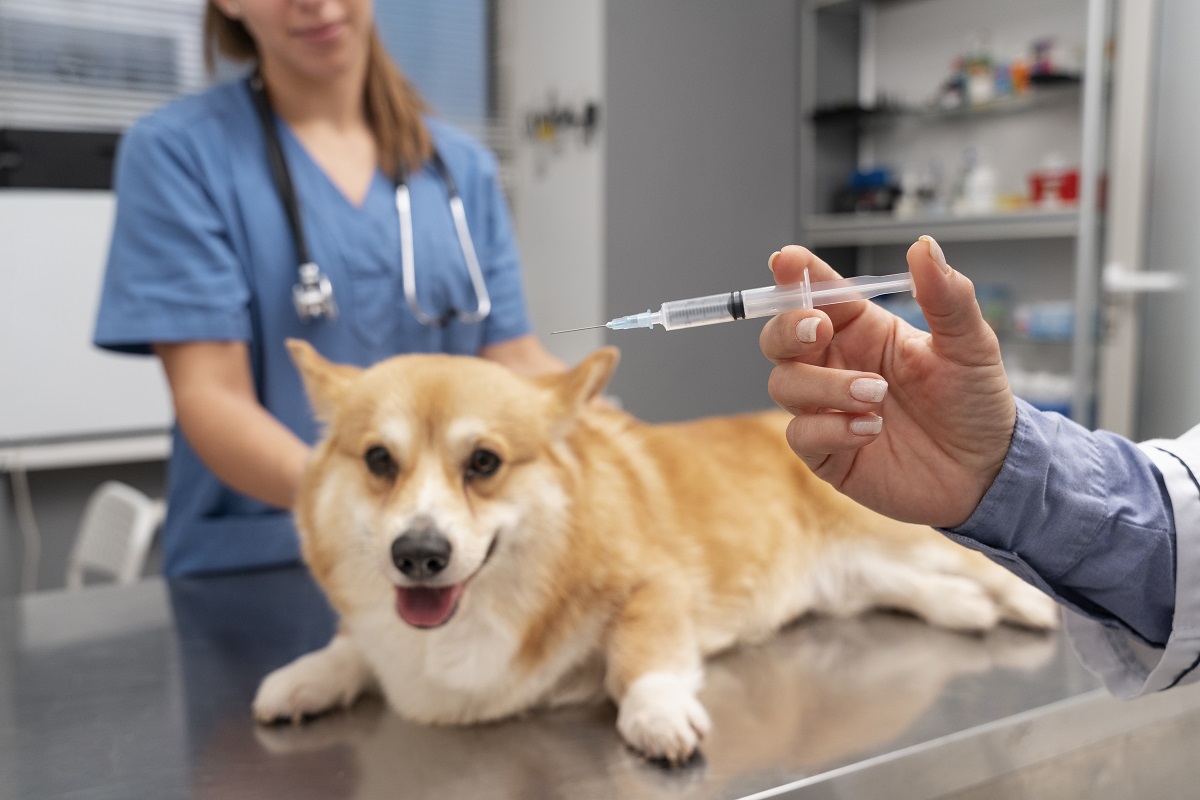
- Vaccines protect dogs from serious and potentially fatal diseases such as rabies, distemper, and parvovirus, while also safeguarding other pets and humans.
- Core vs. non-core vaccines: Core vaccines are essential for all dogs, while non-core vaccines depend on lifestyle, environment, and risk factors.
- Puppies require a series of vaccines starting at 6–8 weeks, with boosters at one year and periodic follow-ups to ensure full immunity.
- Adult dogs need regular boosters to maintain immunity; the schedule varies by vaccine type and risk exposure.
- Senior dogs still benefit from vaccinations, though schedules may be adjusted, and blood tests can help determine immunity levels.
- Side effects from vaccines are usually mild, like lethargy, swelling at the injection site, or temporary loss of appetite; severe reactions are rare but require immediate veterinary attention.
- Planning and record-keeping are crucial: Consult your vet, track booster dates, assess risk factors, and maintain vaccination records for ongoing protection and travel requirements.
Vaccines are designed to protect dogs from serious and potentially deadly diseases. By exposing your dog to a small, safe amount of a virus or bacteria, vaccines help their immune system learn how to fight off the real thing. Without vaccines, even healthy dogs can be at risk of illnesses like rabies, distemper, or parvovirus.
Vaccinating your dog isn’t just about their safety—it’s also about protecting other pets and humans. Certain diseases, like rabies, can be transmitted to people. Keeping your dog vaccinated helps reduce outbreaks in your community and ensures your dog stays healthy throughout life.
What Are Core vs. Non-Core Vaccines?
Not all vaccines are required for every dog. Veterinarians categorize shots into core and non-core vaccines.
Core Vaccines: These are recommended for all dogs, regardless of lifestyle. They protect against diseases that are widespread and potentially fatal. Common core vaccines include:
- Rabies
- Distemper
- Adenovirus (canine hepatitis)
- Parvovirus
Non-Core Vaccines: These depend on your dog’s lifestyle, environment, and risk factors. Non-core vaccines include:
- Bordetella (kennel cough)
- Leptospirosis
- Lyme disease
- Canine influenza
Your veterinarian will help decide which non-core vaccines are necessary based on where you live, your dog’s exposure risk, and health history.
What Vaccines Do Puppies Need?
Puppies have fragile immune systems, so early vaccination is crucial. Puppy vaccines are typically given in a series starting at 6 to 8 weeks old. Here’s a standard schedule:
6–8 Weeks:
- Distemper
- Parvovirus
- Canine hepatitis
- Parainfluenza
10–12 Weeks:
- Second round of distemper, parvovirus, and hepatitis
- Bordetella (if boarding or socializing)
14–16 Weeks:
- Rabies vaccine
- Third round of distemper, parvovirus, and hepatitis
12–16 Weeks:
- Optional: Leptospirosis or Lyme disease depending on risk
Puppies also need booster shots at one year, then every 1–3 years depending on the vaccine type. Keeping up with the puppy schedule is critical to prevent serious diseases before they fully develop immunity.
How Often Should Adult Dogs Be Vaccinated?
Adult dogs usually need boosters to maintain immunity. After the first year, core vaccines are often given every 1–3 years. Non-core vaccines may be administered annually or based on risk exposure.
Here’s a common adult vaccination schedule:
- Rabies: Every 1–3 years depending on local law and vaccine type
- Distemper, Hepatitis, Parvovirus (DHPP): Every 3 years after initial boosters
- Bordetella: Annually if your dog interacts with other dogs in kennels, parks, or daycare
- Leptospirosis: Annually if at risk from wildlife or outdoor environments
- Lyme Disease: Annually if in tick-prone areas
It’s important to keep a vaccination record and consult your vet regularly. Skipping boosters can leave your dog vulnerable, while unnecessary vaccines can be avoided with professional guidance.
What Vaccines Do Senior Dogs Need?
Older dogs are often less prone to new infections but may have weaker immune systems. Vaccines can still provide protection, but your vet may adjust the schedule or focus on specific vaccines.
Key considerations for senior dogs:
- Core vaccines are generally still recommended, but intervals may be longer.
- Non-core vaccines depend on exposure risk and health conditions.
- Blood tests can sometimes determine whether your dog still has immunity, reducing the need for certain boosters.
Maintaining vaccinations in senior dogs can improve quality of life by preventing diseases that could complicate existing health issues.
What Are Common Canine Vaccines and Their Benefits?
Understanding what each vaccine does can help you make informed decisions for your dog. Here’s a detailed breakdown of common canine vaccines and why they matter:
Rabies
- Protects against a fatal virus that affects the nervous system.
- Can be transmitted to humans and other animals, making it a public health concern.
- Legally required in most regions, and often necessary for boarding, travel, and grooming.
- Typically given as a single shot for puppies, with boosters every 1–3 years depending on local laws.
Distemper
- Prevents a highly contagious viral infection affecting the respiratory, gastrointestinal, and nervous systems.
- Symptoms can include coughing, diarrhea, seizures, and sometimes death.
- Often combined in a multivalent vaccine with parvovirus, adenovirus, and parainfluenza (DHPP).
- Core vaccine recommended for all dogs.
Parvovirus
- Protects against a severe, highly contagious virus, especially dangerous in puppies.
- Symptoms include vomiting, diarrhea (often bloody), lethargy, and dehydration.
- Without treatment, infection can be fatal.
- Usually administered in a series starting at 6–8 weeks of age.
Adenovirus (Canine Hepatitis)
- Protects the liver from infectious canine hepatitis virus.
- Helps prevent respiratory issues and bleeding disorders linked to adenovirus infection.
- Often combined with distemper, parvovirus, and parainfluenza in a single shot.
Parainfluenza
- Part of the kennel cough complex, which affects the respiratory system.
- Symptoms include coughing, nasal discharge, and mild fever.
- Often given in combination vaccines or separately for dogs at higher risk of exposure.
Bordetella (Kennel Cough Vaccine)
- Protects against Bordetella bronchiseptica, a primary cause of kennel cough.
- Especially recommended for dogs that frequent boarding facilities, daycare, dog parks, or social events.
- Can be given as an injectable, oral, or intranasal vaccine depending on your vet’s recommendation.
Leptospirosis
- Protects against bacteria that can cause severe kidney and liver disease.
- Often contracted from standing water, wildlife, or damp environments.
- Recommended for dogs with outdoor exposure or in regions where the disease is common.
- Usually given annually, sometimes in combination with other vaccines.
Lyme Disease
- Protects against bacteria transmitted by ticks, particularly in regions with high tick populations.
- Symptoms can include joint pain, fever, lethargy, and kidney issues.
- Recommended for dogs who spend time outdoors in grassy, wooded, or tick-prone areas.
Canine Influenza (Dog Flu)
- Protects against strains of canine influenza virus, which spreads quickly among dogs.
- Symptoms include coughing, nasal discharge, fever, and lethargy.
- Especially important in areas with outbreaks or for dogs that socialize frequently.
- Administered as an annual vaccine, sometimes in a two-dose series initially.
How to Plan Your Dog’s Vaccination Schedule
Planning a vaccination schedule involves more than just marking dates on a calendar. Here’s how to create a plan that keeps your dog protected:
- Consult Your Vet: They can recommend vaccines based on age, lifestyle, and risk factors.
- Start Early: Puppies need multiple doses to develop strong immunity.
- Track Booster Dates: Use reminders to avoid missing important shots.
- Assess Risk Factors: Boarding, socializing, outdoor activities, and regional disease prevalence can change which vaccines are needed.
- Maintain Records: Keep a copy of all vaccinations for vet visits, boarding, and travel purposes.
A well-planned vaccination schedule ensures your dog stays healthy and helps prevent costly illnesses later.
What Are the Risks of Skipping Vaccines?
Skipping vaccines can leave your dog vulnerable to serious, sometimes fatal diseases. Some risks include:
- Increased likelihood of contracting contagious illnesses
- Higher risk of severe symptoms and complications
- Risk of transmitting diseases to other pets or humans
- Potential legal issues (like rabies requirements)
While vaccines are generally safe, discussing your dog’s health history with a veterinarian ensures that your dog receives only the necessary shots.
Common Myths About Dog Vaccines
There are plenty of myths surrounding dog vaccines, but it’s important to separate fact from fiction.
- Myth 1: Vaccines cause disease. Vaccines may have mild side effects like soreness or a low fever, but they do not cause the diseases they protect against.
- Myth 2: Older dogs don’t need vaccines. Senior dogs can still benefit, especially if immunity has waned.
- Myth 3: Natural immunity is enough. Exposure to disease without vaccination is risky and can lead to severe illness or death.
- Myth 4: Dogs only need rabies shots. Rabies is important, but other core and non-core vaccines protect against serious illnesses.
Understanding the truth helps owners make confident, informed decisions.
How to Handle Vaccine Side Effects
Most dogs tolerate vaccines well, but mild side effects are normal and usually short-lived. Understanding what to expect and how to respond can help you feel confident in caring for your dog after vaccination.
Common Mild Reactions
- Mild fever or lethargy
- Your dog may seem a little tired, sleepy, or less active than usual.
- A mild fever is a normal immune response as the body builds protection.
- Typically resolves within 24–48 hours.
- Swelling, redness, or soreness at the injection site
- The area where the shot was given may appear slightly raised or tender.
- Some dogs may lick or nibble at the spot.
- Applying a cool compress can help reduce discomfort.
- Loss of appetite for a day or two
- Temporary appetite changes are common after vaccination.
- Ensure your dog stays hydrated and offer small, light meals.
- Mild coughing or sneezing (for intranasal vaccines like Bordetella)
- Usually short-lived and not a cause for concern unless symptoms worsen.
Rare but Serious Reactions
Severe reactions are uncommon, but it’s important to recognize the signs so you can act quickly:
- Vomiting or diarrhea
- Swelling of the face, lips, or throat
- Difficulty breathing or wheezing
- Collapse or extreme weakness
- High fever or persistent lethargy
If your dog shows any of these severe symptoms, contact your veterinarian immediately. Severe reactions may require emergency treatment, such as antihistamines, corticosteroids, or supportive care.
Tips for Reducing Side Effects
- Schedule vaccinations when you can monitor your dog for several hours afterward.
- Avoid strenuous activity for a day or two after vaccination.
- Make sure your dog is healthy at the time of vaccination; sick dogs may have a higher risk of side effects.
- Keep a record of past reactions to inform future vaccinations.
By understanding the potential side effects and knowing how to respond, you can ensure your dog stays safe and comfortable while building strong immunity.
Traveling with Your Dog: Vaccine Considerations
Traveling with your dog requires careful planning, including up-to-date vaccinations. Airlines, boarding facilities, and some countries require proof of vaccination for diseases like rabies and canine influenza.
Tips for traveling:
- Keep a digital and physical copy of vaccination records
- Check destination-specific requirements
- Consult your vet well in advance for any additional vaccines or boosters
Summary: What Vaccines Do Dogs Need?
Vaccinating your dog is one of the simplest and most effective ways to keep them healthy throughout life. From puppies to seniors, the right vaccines can prevent serious diseases, protect other pets and humans, and ensure a long, happy life for your furry companion.
Regular veterinary visits, a well-planned schedule, and understanding the difference between core and non-core vaccines are key to keeping your dog safe. By staying informed and proactive, you can answer the question confidently: “What vaccines do dogs need?”



